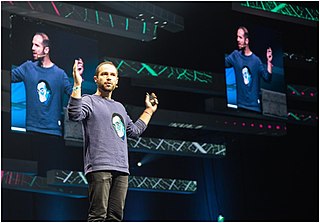A Quote by Joe Gebbia
We believe that the best solutions come from solving your own problem. If you have a real problem, there's likely someone else who can relate. That's how Airbnb was born.
Related Quotes
In other words, the real problem is not exterior. The real problem is interior. The real problem is how to get people to internally transform, from egocentric to sociocentric to worldcentric consciousness, which is the only stance that can grasp the global dimensions of the problem in the first place, and thus the only stance that can freely, even eagerly, embrace global solutions.
You know how it always is, every new idea, it takes a generation or two until it becomes obvious that there's no real problem. It has not yet become obvious to me that there's no real problem. I cannot define the real problem, therefore I suspect there's no real problem, but I'm not sure there's no real problem.
Cities are never random. No matter how chaotic they might seem, everything about them grows out of a need to solve a problem. In fact, a city is nothing more than a solution to a problem, that in turn creates more problems that need more solutions, until towers rise, roads widen, bridges are built, and millions of people are caught up in a mad race to feed the problem-solving, problem-creating frenzy.







































